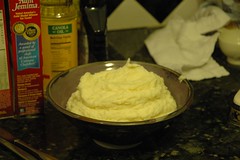Olives

So, it turns out that olives are held to be inedible (because of their bitter taste; they are not poisonous) in their natural state. They must be processed, typically by fermentation, or by soaking in brine or lye.
Reading the Great Wiki further, it seems that both black (ripe) and green (unripe) olives are soaked in sodium hydroxide (Lye, NaOH) and washed, and green ones are then usually allowed to ferment. (Green olives that are not allowed to ferment taste as mild as their black brothers). From the Wiki:
Olives freshly picked from the tree contain phenolic compounds and a unique glycoside, oleuropein, which makes the fruit unpalatable for immediate consumption. There are many ways of processing olives for table use. Traditional methods use the natural microflora on the fruit and procedures which select for those that bring about fermentation of the fruit. This fermentation leads to three important outcomes: the leaching out and breakdown of oleuropein and phenolic compounds; the creation of lactic acid, which is a natural preservative; and a complex of flavoursome fermentation products.
Processing of olive oil, however, is much less involved. In fact, one must just crush them to remove the best stuff. The Great Wiki describes the process this way:
Traditionally, olive oil was produced by beating the trees with sticks to knock the olives off and crushing them in stone or wooden mortars or beam presses. Nowadays, olives are ground to tiny bits, obtaining a paste that is mixed with water and processed by a centrifuge, which extracts the oil from the paste, leaving behind pomace.
Obviously, we need bigger centrifuges.


0 Comments:
Post a Comment
<< Home